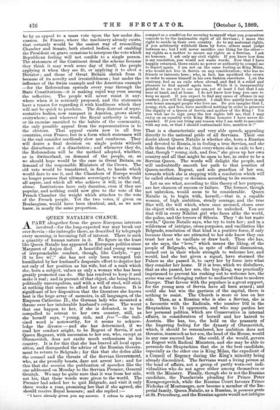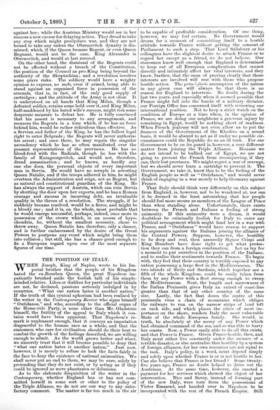QUEEN NATALIE'S CHANCE.
APART altogether from the grave European interests involved—for the long-expected war may break out over Servia—the imbroglio there, as described by telegraph every morning, is becoming full of interest. There is such a quantity of human nature in it. No figure in the least like Queen Natalie has appeared in European politics since Margaret of Anjou died. A beautiful and young woman of irreproachable conduct, though, like Carlyle, " gey ill to live wi'," she has not only been wronged but humiliated by her husband's desperate effort to deprive her not only of her position as his wife, but of a rank which she, born a subject, values as only a woman who has been greatly promoted can do. She has resolved to keep it and make it real ; and in pursuit of that object, she being brave, politically unscrupulous, and with a will of steel, will stick at nothing that seems to afford her a fair chance. It is significant of her disposition that the literature she knows best is the huge array of memoirs, in all languages, of the Empress Catherine II., the German lady who mounted a throne over' er intolerable husband's corpse. The worst that can happen to her, if she is defeated, is to be compelled to retreat to her own country, still, as she herself says, " young, rich, and free"—the itali- cised word is noteworthy, for it seems to acknow- ledge the divorce — and she has determined, if we read her conduct aright, to be Regent of Servia, if not Queen Regnant, with succession to her son, who, except as Obrenovitch, does not excite much enthusiasm in his country. It is for this that she has braved all local oppo- sition, and disregarded the advice of the Russian Govern- ment to return to Belgrade ; for this that she defies alike the counsel and the threats of the Servian Government, who, as she proudly boasts, dare not arrest her ; and for this that she secures the publication of speeches like the one addressed on Monday to the Servian Premier, General Gruitch. We may be quite sure that it was from her side, not his, that these words were given to the world. The Premier had asked her to quit Belgrade, and visit it only :three weeks a year, promising her that if she agreed, she should receive Royal honours; and she replied :— "I have already given you my answer. I refuse to sign any compact as a condition for securing to myself what you yourselves concede to be the inalienable right of all Servians ; I mean the right to reside in their own country. As to my maternal rights, if you arbitrarily withhold them by force, others must judge between us ; but I will never sacrifice one thing for the other— my rights as a mother to secure my rights as a Servian. I ask no honours. I ask only my civil rights. If you knew how firm is my resolution, you would not waste words. Now that I have happily returned, there exists no power or authority to compel me to depart again. I am not on the same footing as King Milan, who would not live in Servia on any consideration; who has no friends or interests here ; who, in fact, has sacrificed the crown in order to amuse himself in his own fashion elsewhere. I, on the contrary, feel as an exile when abroad, and find it a relief and pleasure to find myself again here. While it is inexpressibly painful to me not to see my son, yet at least I feel that I am near at hand, and at home. I do not know how long you care to keep us apart. If you expect to find any cause of offence in my conduct, you will be disappointed. I shall live quietly here in my own house amongst people who love me. Do you imagine that I, young, rich, and free, have sacrificed nothing in order to preserve the dignity of a Queen of Servia and mother of the King ? Yet you wish me to sign away the few rights left me, that I may enjoy on an equality with King Milan honours I have never de- manded. If you can bring any reason why I am unfit to associate with my son, or that I should contaminate him, mention it !"
That -is a characteristic and very able speech, appealing directly to the national pride of all Servians. Their one doubt about Queen Natalie is whether she, born a Russian and devoted to Russia, is in feeling a true Servian, and she tells them that she is ; that everywhere else is exile to her; that, though " young, rich, and free," she gives up her own country and all that might be open to her, in order to be a Servian Queen. The words will delight the people, and will undoubtedly smooth her path to that position of Queen-mother, Regent, and sole guardian of her son, towards which she is stepping with a resolution which will be called obstinacy or decision according to its success.
Let us see what, according to this theory of her purpose, are her chances of success or failure. The former, though not unbroken, would. seem to be considerable. Queen Natalie is, to begin with, herself,—that is, a capable woman, of high ambition, steady courage, and the true Slav will, the will which, when once aroused, closes over its object with a snap, and cannot be unlocked. You see that will in every Nihilist girl who faces alike the world, the police, and the terrors of Siberia. They " do but waste words," Queen Natalie says, who try to turn her; and in a wilderness of intrigue, cross-purposes, and vacillation like Belgrade, resolution of that kind is a positive force, if only because those who are attracted to her side know they can trust her not to vacillate or draw back. Then she has, as she says, the " love," which means the liking, of the people of Belgrade, who, in spite of official dissuasions, turned out in their whole strength to welcome her, and would, had she but given a signal, have stormed the Palace as she passed it, to carry her by force into what they consider her home. If it is true, which we disbelieve, that as she passed, her son, the boy-Sing, was practically imprisoned to prevent his rushing out to welcome her, the scene was one belonging rather to mediaeval than to modern Europe. That favour with the populace is a great support, for the young men of Servia have all been armed; and could she but win the garrison of the capital, there is nothing to resist. The Church is more or less on her side. Then, as a Russian who is also a Servian, she is a favourite with the Radicals, who number 102 in the Skuptschina to 15 opponents, and who may pardon her her personal politics, which are Conservative in internal affairs, in consideration of herself and her hatred to Austria. She has, too, the hold on the peasants of the lingering feeling for the dynasty of Obrenovitch, which, it should be remembered, her ambition does not threaten, inasmuch as her son, the head of the House, would in any case succeed her. She could, if she would, govern as Regent with Radical Ministers, and she may be able to persuade the Skuptschina that she is the best candidate, especially as the other one is King Milan, the expedient of a Council of Regency during the King's minority being already discredited. The Servians want a living person at the head of affairs, not a group of partly worn-out indi- vidualities who do not agree either among themselves or with the Ministry. Finally, though she is not the Russian candidate, the Panslavists pleading for Prince Peter Karageorgevitch, while the Russian Court favours Prince Nicholas of Montenegro, now become a member of the Im- perial family, Queen Natalie, as a Russian, is persona grata at St. Petersburg, and the Russian agents would not intrigue against her; while the Austrian Ministry would see in her success a new excuse for delaying action. They dread to take any step which might precipitate war, and they are not bound to take any unless the Obrenovitch dynasty is dis- missed, which, if the Queen became Regent, or even Queen Regnant, would not be the case. King Alexander is Obrenovitch, and would at last succeed.
On the other hand, the dismissal of the Regents could not be effected without a breach of the Constitution, the position of the Council as pro-King being beyond the authority of the Skuptschina ; and a revolution involves some grave risks. The soldiery would have a weighty opinion to express, no mob, even if armed, being able to stand against an organised force in possession of the arsenals, that is, in fact, of the only good supply of cartridges ; and the attitude of the Army is not clear. It is understood on all hands that King Milan, though a defeated soldier, retains some hold over it, and King Milan, half-maddened by his hated wife's success, might risk some desperate measure to defeat her. He is fully convinced that his assent is necessary to any arrangement, and menaces the Regents in a tone which, if he has no force behind him, would be rather ridiculous than effective. As a Servian and father of the King, he has the fullest legal right to enter Belgrade ; the Regents will never authorise his arrest ; and once there, he may regain the singular ascendency which he has so often manifested over the peasant representatives of the provinces. He has no blood-feud with the Radicals, though he has with the family of Karageorgevitch, and would not, therefore, dread assassination ; and he knows, as hardly any one else does, the personal objects of every important man in Servia. He would have no scruple in arresting Queen Natalie, and if the troops adhered to him, he might overturn the Administration and reign, not as Regent, but as natural and constitutional guardian of the King. He has always the support of Austria, which can ruin Servia by shutting the door upon her exports, and he has a Roman courage and success in incurring debt, an invaluable quality in the throes of a revolution. The struggle, if he suddenly became resolved, would be a fierce, and might be a bloody one ; and it is, on the whole, most probable that he would emerge successful, perhaps, indeed, once more in possession of the crown which, in an access of hypo- chondria, he, without the smallest necessity, chose to throw away. Queen Natalie has, therefore, only a chance, and is further embarrassed by the desire of the Great Powers to postpone any event which might bring them into collision ; but still, she has a chance good enough to fix a European regard upon one of the most separate figures of our time.







































 Previous page
Previous page